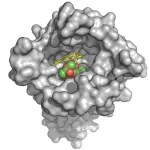(Press-News.org) Researchers at the University of Toronto, Indiana University and University of Notre Dame have detected levels of toxic PFAS chemicals—short for per- and polyfluoroalkyl substances—for the first time in Canadian fast-food packaging, specifically water-and-grease repellent paper alternatives to plastic.
Published today in Environmental Science and Technology Letters, the findings suggest that food packaging exposes people directly to PFAS, which have been linked to serious health effects such as increased cancer risk and immune system damage, by contaminating the food they eat. Further, once discarded packaging enters waste streams, PFAS enter the environment, where these “forever chemicals” will never break down. These health and environmental risks have prompted 11 U.S. states to ban PFAS from most food packaging, and two major restaurant chains to commit to becoming PFAS-free by 2025.
“As Canada restricts single-use plastics in food-service ware, our research shows that what we like to think of as the better alternatives, such as paper wrappers and compostable bowls, are not so safe and ‘green’ after all. In fact, they may harm our health and the environment—from our air to our drinking water—by providing a direct route to PFAS exposure,” says Miriam Diamond, professor in the Department of Earth Sciences and School of the Environment at the University of Toronto and study co-author.
For the study, the researchers collected 42 paper-based wrappers and bowls from fast-food restaurants in Toronto and tested them for total fluorine, an indicator of PFAS. They then completed a detailed analysis of eight of those samples with high levels of total fluorine. Fibre-based moulded bowls, which are marketed as “compostable”, had PFAS levels three to 10 times higher than doughnut and pastry bags. PFAS are added to these bowls and bags as a water- and grease-repellent.
PFAS are a complex group of about 9,000 manufactured chemicals, few of which have been studied for their toxicity. A PFAS that is known to be toxic—6:2 FTOH (6:2 fluorotelomer alcohol)—was the most abundant compound detected in these samples. Other PFAS that were commonly found in all the Canadian fast-food packaging tested can transform into this compound, thereby adding to a consumer’s exposure to it. They detected several PFAS for the first time in food packaging, showing how difficult it is to track the presence of this large family of compounds.
Critically, the researchers found that the concentration of PFAS declined by up to 85 per cent after storing the products for two years, contradicting claims that polymeric PFAS—a type composed of larger molecules—do not degrade and escape from products. The release of PFAS from food packaging into indoor air presents another opportunity for human exposure to these chemicals.
“The use of PFAS in food packaging is a regrettable substitution of trading one harmful option—single-use plastics—for another. We need to strengthen regulations and push for the use of fibre-based food packaging that doesn’t contain PFAS,” says Diamond.
###
END
New study finds toxic PFAS “forever chemicals” in Canadian food packaging
2023-03-28
ELSE PRESS RELEASES FROM THIS DATE:
Eco-efficient cement could pave the way to a greener future
2023-03-28
HOUSTON – (March 28, 2023) – The road to a net-zero future must be paved with greener concrete, and Rice University scientists know how to make it.
The production of cement, an ingredient in concrete, accounts for roughly 8% of the world’s annual carbon dioxide emissions, making it a significant target of greenhouse gas emissions reduction goals. Toward those efforts, the Rice lab of chemist James Tour used flash Joule heating to remove toxic heavy metals from fly ash, a powdery ...
Advanced electrode to help remediation of stubborn new 'forever chemicals'
2023-03-28
CHAMPAIGN, Ill. — As new environmental regulations are rolling out to mitigate the industry-retired long-chain chemicals known as PFAS in drinking water, there are concerns regarding a new breed of “forever chemicals” called short-chain PFAS. Research from the University of Illinois Urbana-Champaign is helping shift the focus to include mitigation of the chemicals – which researchers say are just as persistent as, more mobile and harder to remove from the environment than their long-chain counterparts.
A ...
How to prepare for ocean acidification, a framework
2023-03-28
SAN FRANCISCO, CA (March 28, 2023) — In a paper published today in the journal Environmental Research Letters, an international research team composed of scientists affiliated with more than a dozen institutions, including the California Academy of Sciences, propose a first-of-its-kind framework for governments around the world to evaluate their preparedness for—and guide future policies to address—ocean acidification, among the most dire threats to marine ecosystems.
“Ocean acidification is one of climate change’s silent killers,” says Rebecca Albright, PhD, Academy Curator of Invertebrate Zoology and ...
Even Sonoran Desert plants aren’t immune to climate change
2023-03-28
In North America’s hottest, driest desert, climate change is causing the decline of plants once thought nearly immortal and replacing them with shorter shrubs that can take advantage of sporadic rainfall and warmer temperatures.
Many studies have documented how a hotter, drier world is causing a redistribution of plants in temperate mountain regions. A new UC Riverside study documents the unexpected ways plants in part of the Sonoran Desert are doing the same.
“The plants ...
Pulsing ultrasound waves could someday remove microplastics from waterways
2023-03-28
INDIANAPOLIS, March 28, 2023 — Colorful particles of plastic drift along under the surface of most waterways, from headwater streams to the Arctic Ocean. These barely visible microplastics — less than 5 mm wide — are potentially harmful to aquatic animals and plants, as well as humans. So, researchers are devising ways to remove them and to stop them at their source. Today, a team reports a two-stage device made with steel tubes and pulsing sound waves that removes most of the plastic particles from real water samples.
The researchers will present ...
Modern origami method creates glass shapes by folding
2023-03-28
INDIANAPOLIS, March 28, 2023 — The ancient art of origami is well known for transforming sheets of paper and other foldable materials into complex 3D shapes. But now, chemical engineers have extended the centuries-old practice to produce intricate shapes made of glass or other hard materials. Their thoroughly modern method, which can be combined with 3D printing, could have applications ranging from sculpture to catalysis and beyond.
The researchers will present their results today at the spring meeting of the American Chemical Society (ACS). ACS Spring 2023 is a hybrid meeting being held virtually and in-person ...
Marijuana-derived compounds could reverse opioid overdoses
2023-03-28
INDIANAPOLIS, March 28, 2023 — There’s been a recent push in the U.S. to make naloxone — a fast-acting opioid antidote — available without a prescription. This medication has saved lives, but it’s less effective against powerful synthetic opioids, such as fentanyl. In an interesting twist, researchers are now looking to cannabidiol (CBD), a component of marijuana, as a possible alternative to the popular antidote. Today, a team reports compounds based on CBD that reduce fentanyl binding and boost the effects of naloxone.
The researchers will present their results at the spring meeting of the American Chemical Society (ACS). ...
Is it COVID-19 or the flu? New sensor could tell you in 10 seconds
2023-03-28
INDIANAPOLIS, March 28, 2023 — Have a cough, sore throat and congestion? Any number of respiratory viruses could be responsible. Conventional tests can identify certain likely culprits by relying on chemical reactions, but some researchers want to swap chemistry for electrical changes sensed by nanomaterials. Today, scientists report using a single-atom-thick nanomaterial to build a device that can simultaneously detect the presence of the viruses that cause COVID-19 and the flu — at much lower levels and much more quickly than conventional tests for either.
The researchers will present their results at the spring meeting ...
Shedding pounds may benefit your heart — even if some weight is regained
2023-03-28
Research Highlights:
Weight loss was associated with decreased risk factors for cardiovascular disease and Type 2 diabetes for at least five years — even if some weight was regained, according to a review of research on behavioral weight loss programs.
People who lost weight through an intensive behavioral weight loss program had lower systolic blood pressure levels, total cholesterol-to-good cholesterol ratio and HbA1c levels (a diabetes marker), when compared to people who did not participate in a program or participated in a lower-intensity behavioral program.
Embargoed ...
Turtles and crocodiles with unique characteristics are more likely to go extinct
2023-03-28
New research led by the University of Oxford has revealed that the most endangered turtle and crocodile species are those that are most unique. Their loss could have widespread impacts on the ecosystems they live in, since they carry out critical processes important for many other species.
Turtles and crocodiles are two of the world's most endangered animal groups, with approximately half of species globally threatened (International Union for Conservation of Nature, IUCN). Greater understanding on which species are most threatened and why is urgently needed to inform conservation efforts to save them.
In a new study led by researchers at the Department of Biology, ...








